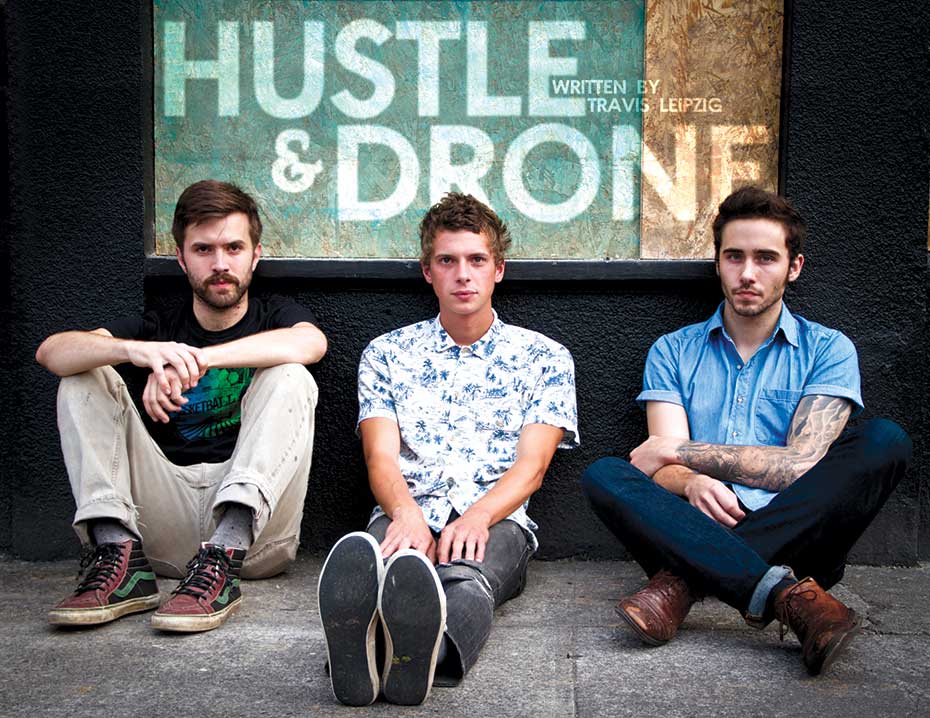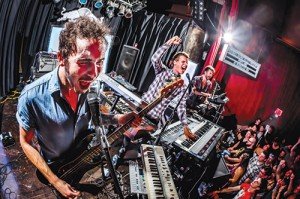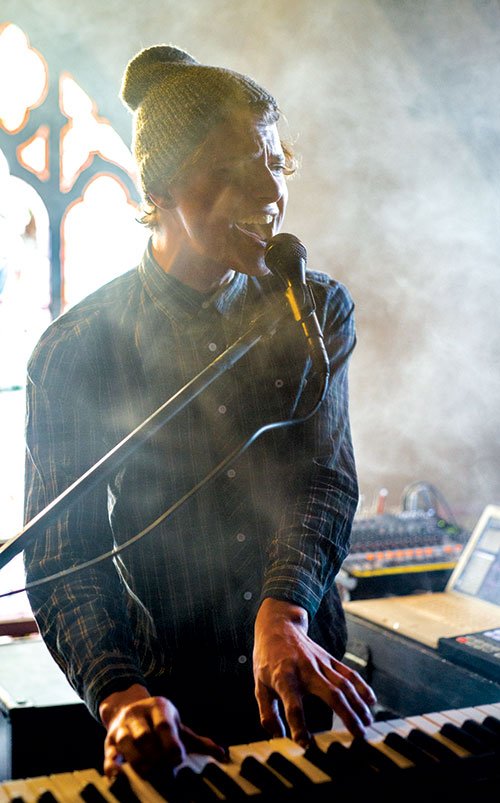Hustle & Drone


To achieve success at nearly any one thing, comfort levels must be abandoned and the body and mind committed fully to an objective. Or you just have to be extremely fucking lucky. Having all the variables of that formula in a row, the only logical outcome to the unknown for Portland’s Hustle & Drone is prosperity. Led by former Portugal. The Man keyboardist Ryan Neighbors, Hustle & Drone play a soulful blend of industrial electronic beat-driven synth-heavy power pop. Following a two-year period since the release of their self-titled debut EP, the trio is back with their debut LP Holyland, out September 2. I had the pleasure of enjoying several libations with Neighbors as we discussed his departure from PTM, the making of the Holyland, and how Red Bull not only gives you wings but also helps musicians across the globe.
ELEVEN: Ryan, you played keys with Portugal. The Man for five years before leaving to pursue Hustle & Drone. Can you give some insight into that decision?
Ryan Neighbors: Well as you said, I was playing with Portugal for five years, which consisted of constant touring, writing, and recording—which is something I absolutely love doing, but it also led to a five year break from being able to write my own music. I mean, I still wrote songs and demos in Garageband, but I knew I never would’ve been able to truly see how far my songwriting could go if I didn’t devote myself to it 100 percent. It was a very difficult decision, because I had a routine and a comfortable life and a full-time job playing music. But at the end of the day I wasn’t happy, and that is kind of the most important thing. Plus I was about to turn 25, and it takes time to get a band off the ground—so I figured it was now or never.
11: You churned out a debut EP immediately after leaving PTM. Now two years later you’re back with a debut full-length, Holyland. Was there anything different about your process?
RN: When we started recording the EP, we gave ourselves a deadline. Portugal had a tour booked at the beginning of April [2012] and I wanted there to be no confusion as to what I was up to and why I wasn’t on tour. So if anyone asked the dudes, “Where is Ryan?” they could give a clear answer and people would be able to go find the music. So we spent the next month writing demos—we had about twelve, and we picked the five strongest and did our best to complete them. I think we did a good job, but what I have noticed from recording Holyland is that time and breath and space do wonders for songwriting.

We treated Holyland very differently. Because in my opinion, if this record isn’t the best I can possibly do, what the fuck am I doing with my life. We had about 40 demos for Holyland that I sent to my buddy Sonny DiPerri who I knew from some Portugal recording sessions. He has a great ear and knows his shit about synths and sequencers. He sent me back like four paragraphs about each demo with in-depth, well thought out notes. I called him and said, “Too bad we can’t just make a record together.” And he of course said, “Let’s do it.” Bringing in an outside ear brought a lot to the table. Some musicians get very set in their ways, and until I was able to hear things differently, I never would’ve known what would work—synth and drum sounds that I just didn’t have access to. Having a dude around who wouldn’t even crack a beer until the work day was done, which I personally could never do. . . but someone needed to be that person. He was also the guy to wake us up in the morning when it was time to get up and finish songs. We worked with Sonny for two weeks in Portland and two weeks at a beach house before parting ways with solid instrumentals of each song while I finished up lyrics. Leaving things open did so much for the record. We ended up adding a song (“I Just Need Some Money”) right before mastering. It wasn’t even going to be on the record, but we let ourselves have that option. There would’ve been a time when I would’ve said, “No, we can’t add a brand new song—the record is done already.” I am really glad I didn’t do that.
11: So you spent some time at the coast while recording. How was that?
RN: Writing at the beach was amazing. It’s great to just escape your job and your friends for a bit. I mean I love my friends, but I don’t get much recording done when there are shows every night that everyone I know is going to. So we went out to Pacific City and stayed in an amazing house right on the beach. We worked about 12-hour days, lounged, and ate awesome food. There wasn’t really anything else to distract us from working on the record. I will personally continue to leave Portland when I really want to finish something important artistically.
11: There was a change in your lineup during the process of making Holyland. Did that affect the way the album turned out?
RN: Well, I started the band with my good friend Kirk Ohnstad, and a couple weeks after we got back from a recording session at the beach house he decided to leave the project. He was having second thoughts about pursuing music full-time, and I can’t blame him for that. I was very upset at the time—in fact I had no hope at all. I didn’t think I could finish the record on my own, piece the live band back together, or replace the gear that didn’t belong to me. It changed the record drastically. Because for one, it removed the songs he had written, and it helped shape a lot of the songs lyrically for me. One of the songs, “Holdin’ On To It,” is completely about that experience of Kirk leaving the band and my denial that it had actually happened and that maybe he would come back and have a change of heart. Ryan Moore was already playing keys and doing vocals for us live, and my younger brother Liam suggested I ask long-time friend Andy Black to play bass. Andy grew up playing music with Liam, and I knew he was an amazing musician who currently wasn’t in a band. So I asked him and he was down and it kind of just worked out perfectly. I think the next record will be much more definitive of our current three-piece band, whereas Holyland turned out to be mostly me and Sonny. But the three of us have been writing in practice and already have about 50 demos for the next one. It’s sounding way more live and collaborative, because it is—and I am actually very thrilled about it all.
11: So I’ve seen your billboard and your amazing new music video for “The Glow,” and I’ve heard rumor of a Hustle & Drone action figure. Red Bull is involved with this, correct? What is your relationship with them?

RN: Well it all started when we played a Red Bull Sound Select show last December. We became a part of this platform and met a bunch of rad people who were stoked on the band. When the record was done I sent it over to Bim Ditson, who passed it on to a bunch of other Red Bull people he worked with. A month or so later they decided they wanted to release the record digitally. And of course if you are a company like Red Bull, you don’t really half-ass anything. So I told them about a music video idea I had that takes place in a gym with a bunch of crazy stuff happening, and Aaron Lutze [Field Marketing Manager at Red Bull] suggested we try to shoot it at the MODA Center, which we were actually able to do. And then Red Bull had billboards put up for all of the Sound Select artists that were a part of Musicfest NW. So now we’re on a billboard. It’s all very surreal and amazing. So far everything we have done together has been awesome—just a bunch of cool ideas and cool people figuring out how to make it happen. We had the action figures made for a media kit to send out to a bunch of larger publications, which again is an insane idea and it actually happened. It’s just crazy to see everything coming together for this record to be released.
11: Do you mind if I ask about the title Holyland? Is there a religious or spiritual connotation?
RN: I guess you could say that. Holyland is about finding a happiness or inner peace—a place where you can be, where everything is good. I spent half my life thinking Jesus was happiness, and it wasn’t. I spent five years touring in a successful band and that didn’t do it for me either. It’s all kind of about exploring new things in your life and finding something that makes you happy—something to fight for and live for. I think that it is a constant struggle, because obviously goals and passions change. But yeah, that’s what Holyland means to me: getting to your place. »
– Travis Leipzig




